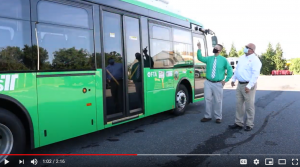Frederick County Revs Up New Electric Buses with Help from the Maryland Energy Administration
Frederick County has just completed a multi-year effort, utilizing grant funds from the Maryland Energy Administration (MEA) via the Maryland Smart Energy Communities (MSEC) grant program, and bringing four fully-electric transit buses into service. Frederick County received a total of $248,500 from the MSEC program during the fiscal years 2016 – 2018. The county also leveraged additional funding sources to migrate more of their public transit vehicles toward clean fuel sources and away from fossil fuel sources.
“TransIT is grateful for the opportunity to partner with the Federal Transit Administration, the Maryland Department of Transportation and the Maryland Energy Administration to purchase no-emission buses. Our department spends roughly $40,000 a year per on diesel fuel, maintenance and operations (for traditional fueled buses), ”explained Roman Steichen, Transit Services of Frederick County Division Director. “These new electric buses will reduce those costs significantly while reducing our carbon footprint, and provide local residents and visitors a way to get around town in a much quieter fashion than a traditional diesel bus,” concluded Steichen.
According to Dawn Ashbacher, Frederick County’s Sustainability Program Manager, “By removing four older diesel buses, annual diesel fuel usage could decrease by as much as 14,250 gallons.”

Click here to see a video on the new busses
Reducing that amount of diesel fuel equates to a decrease of 327,750 pounds of CO2 emissions. In addition, the electric buses are charged from power produced by the county’s large-scale solar photovoltaic system via a virtual process, known as aggregate net metering which allows governments, agricultural entities and non-profits to easily credit clean electricity generated from one location to others, at the county landfill. This virtual powering allows the county to generate solar power in one place and use it in a different place, meaning the buses really do run on clean, renewable fuel.
The 30-foot electric buses are the first of their type to join a transit fleet in the State of Maryland. A bus can be fully charged in about four hours, can go 150 miles between charges, and can operate in all temperatures.
Here is a video of the buses being delivered to their new base of operations.
Past electric bus skeptics cited unfounded risks by bunching too many high-voltage batteries on one vehicle. There was, in fact, a fire on the top of one of TransIT Services older electric buses in 2016, however, the fire resulted from faulty wiring and a failed temperature sensor. According to Mr. Steichen, all of TransIT’s electric buses have been thoroughly inspected for similar issues, and those that required it were repaired to proper operating condition.
Electric buses offer zero-emission, quiet operation and better acceleration compared to traditional buses. Electric buses typically recover braking energy to increase efficiency by a regenerative brake. Additionally the cost of ownership is lower than diesel buses. Other local governments are taking similar actions, Anne Arundel County has recently made major commitments to an electric fleet including a commitment to convert its light and medium duty vehicles to electric by 2037 and Montgomery County recently “rolled out” its first four electric buses.
To learn more about the MSEC program or to see if your county, city or town is already a MSEC participant, click here.



 1-888-373-7888
1-888-373-7888 233733
233733